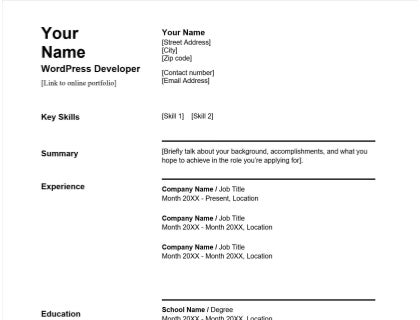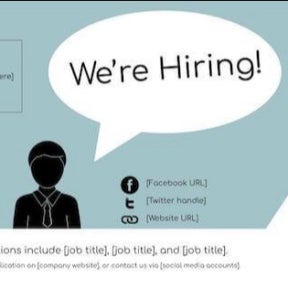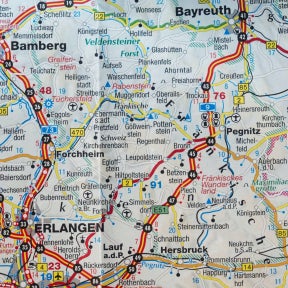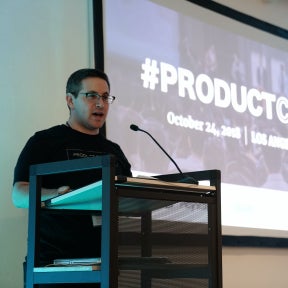
WordPress Developer Resume Free Template
Download this WordPress developer resume template in Microsoft Word format.
Download NowWordPress Developer Resume Example:
Your Name
WordPress Developer
[Link to online portfolio / website / LinkedIn profile]
[Street Address]
[City]
[Zip code]
[Contact number]
[Email Address]
Summary:
[Briefly talk about your background, skills, and qualifications.]
Key Skills:
[Skill 1]
[Skill 2]
Experience:
Company Name / Job Title Month 20XX - Present, Location
Company Name / Job Title Month 20XX - Month 20XX, Location
Company Name / Job Title Month 20XX - Month 20XX, Location
Education:
School Name / Degree Month 20XX - Month 20XX, Location
Institution Name / Certificate Month 20XX - Month 20XX, Location
Notable Achievements:
[Achievement 1]
[Achievement 2]
Awards and Promotion:
[Award of merit 1]
[Job promotion 1]
How to Write a WordPress Developer Resume:
A complete guide to writing a WordPress developer resume with a free template.
Start with a summary.
Make your summary stand out.

You'd need your summary to create a lasting impression, intriguing employers enough to continue reading your resume. Start by highlighting your most desirable qualities including your skills, years of experience, and top achievements.
Keep your summary short and to the point.

Try to keep your summary under four sentences and only include the most pertinent information. Add a sentence about how your specific skill set and experience will benefit the employer's organization.
Highlight your technical skills.
Start with your most important skills.

Mention your core WordPress development skills first, such as coding interactive web elements, e-commerce experience, website security, and programming language proficiency.
Be sure to mention all relevant skills that could set you apart from other candidates.
Match your skill set with the job posting.

You'll want to directly match your skills with the job requirements and do not list skills that will not be needed for the position. List all relevant skills and competencies you have acquired over time.
Be honest.

When listing your skills, remain honest about your level of expertise as the recruitment process may require practical assessments.
Add your work experience.
List your experience in reverse chronological order.

The work history section is a crucial part of your resume as employers will want to read about the WordPress projects and tasks you've completed in previous roles. You'll want to start this section with your most recent position.
Add the places you have worked.

Pay special attention to the responsibilities you were assigned in previous positions. This will help employers envision you in the role and determine the type of tasks you're knowledgeable in.
Outline your education information.
Add your qualifications.

In reverse chronological order, add your qualifications. Each qualification entry should mention an institution name, the dates of attendance, and a location.
Indicate qualifications in progress.

If you're studying towards a qualification, mention it at the start of this section. Omit the initial date and instead include the words "In Progress."
List any relevant certificates.

While your portfolio of WordPress projects already says a lot about you and your abilities, to help improve your chances of an interview, consider adding relevant certifications, even if not required.
Be sure to include the institution and the date you obtained your certification. Certificates awarded by accredited institutions indicate to employers that you have formal training and that you're passionate about your job.
Showcase your career achievements.
Add career milestones.

Your career highlights are a great addition to your resume because they act as solid references, proving to employers that you're more than capable of exceeding their expectations.
You'll immediately want to capture an employer's attention, so start this section with your most impressive WordPress projects.
Describe major completed projects.

Provide sufficient details of your proudest accomplishments, for example, developing popular WordPress themes and plugins, presenting technical proposals to big clients, boosting traffic to a website by optimizing SEO, and more.
Be sure to include metrics to emphasize the impact your achievements had on the business. The more specific, the better.
Include awards and promotions.
Add key career highlights at the end of your resume.

These usually include professional achievements such as career awards or notable job promotions that may be of particular interest to employers.
Provide the details of your professional achievements.

Use bullet points to briefly describe each highlight and list them in reverse chronological order. Remember that each entry should also identify the institution/employer. Don't neglect to provide a date.
What Employers Look for in a WordPress Developer's Resume:
- A list of programming languages you have proficiency with. Popular languages for WordPress developers are HTML, CSS, JavaScript, and PHP.
- A list of internet marketing skills including proficiency with Google Analytics, PPC campaigns, SEO, E-commerce tools, and more.
- A demonstrated ability to identify problems and find solutions to them.
- Evidence of working as part of a team and with different departments, including marketing.
- An emphasis on customer service.
- A history of working under pressure to meet client deadlines.
- An understanding of client needs and the ability to adapt to different web development challenges.
- A relevant degree in computer science. A diploma or certificate in WordPress development or internet marketing will help you.
- A link to an online portfolio of work that demonstrates a wide range of WordPress development projects.


